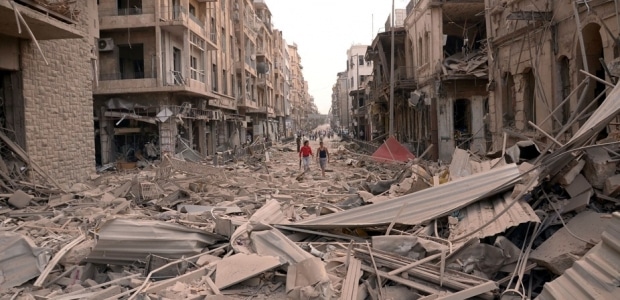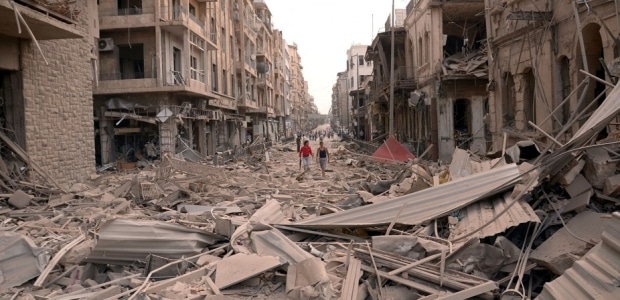I had been trying to get to Aleppo for ages, but was unable to do so because rebel activity had cut off the city from the outside world. Syrian government military successes at the start of January meant there was at last a safe road. I hired a driver, was allocated a government minder (very handy at checkpoints), and booked into a hotel. Driving north from Damascus, we picked up a 22-year-old Syrian army lieutenant called Ali, returning to his unit after eight days’ leave with his family.
We drove through Homs — miles and miles of utter devastation — and then east on to the Raqqa road. Ali told me that he had been assigned to Kuweires military airport east of Aleppo, which was under siege for three years from Al Nusra and Islamic State forces. He spoke of daily firefights against Isis fighters. For long periods his unit was entirely cut off. When Ali was shot in the chest there was no question of being airlifted out. He convalesced in a field hospital. Eventually the siege was lifted and Ali could return home and see his parents for the first time in more than two years. ‘The secret behind Kuweires was the loyalty of the soldiers. We had no tanks. I lost 82 comrades,’ said Ali. Now his unit is mopping up Islamic State positions round Al-Bab to the East of Aleppo.
When we reached Aleppo there had been no electricity for 112 days and no water for almost two weeks. Improvised mortars — gas canisters explosive enough to bring down buildings — can fall anywhere. Seventeen of the giant student dormitory blocks at the university are now set aside for displaced families from rebel-held areas. All the families have terrifying stories to tell about intimidation and murder at the hands of fanatical Al Nusra, Isis or Free Syrian army forces. These refugees are everywhere. …
Again and again I was asked: why is Britain supporting the terrorists? Western media rightly emphasize Assad’s atrocities. But the Aleppans I spoke to regularly pointed out that under Assad’s regime women can walk alone down the street and pursue a career; that a broadly liberal curriculum is taught in the schools; that Christians can worship at their churches and Muslims in their mosques. These Aleppans have lived under siege from groups hellbent on the imposition of a mutant version of Wahhabi Islam.
Fair Use Excerpt. Read the whole article here.


